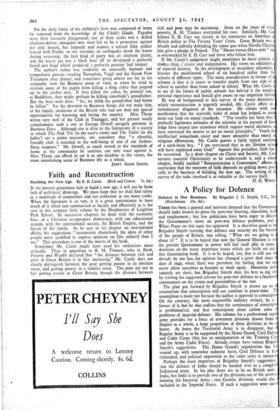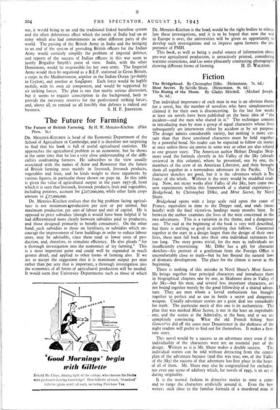A Policy for Defence
Defence is Our Business. By Brigadier J. G. Smyth, V.C., M (Hutchinson. 10s. 6d.)
THERE has been a general and insistent demand that the Governme should make known its plans for post-war housing, education, heal and employment ; but few politicians have been eager to discov the Government's views on post-war defence problems, and White Paper on this topic has appeared. It is therefore good to h Brigadier Smyth insisting that defence and security are the busin of the people of Britain, and asking, " What are we going to about it? " It is to be hoped that now the General Election is or the present Government in power will feel itself able to come decisions on the many important issues which are fairly set out this illuminating book. It is to be hoped, too, that it will not th already be too late, for opinion has changed a great deal since days of 1940, when there was prevalent the feeling that we mu never allow ourselves to become so weak again. Memories unfo tunately are short, but Brigadier Smyth does his best to jog the by relating his suggested scheme for post-war defence to a fascinati commentary on the events and personalities of the war.
The plan put forward by Brigadier Smyth is drawn up on t assumption that conscription will not continue in peace-time. assumption is made not because the author is opposed to conscripno On the contrary, like most responsible military writers, he is favour of it, but he also realises that the continuance of conscripti is problematical, and that conscription alone cannot solve problems of imperial defence. His scheme for a professional reaul army provides for a force of seventeen divisions drawn from t Empire as a whole, a large proportion of these divisions to be al borne. At home the Territorial Army is to disappear, but Regular Army is to be supported by the Home Guard, Civil Defen and Cadet Corps (this last an amalgamation of the Training Cor and the Army Cadet Force). Already events have outrun Brigadi Smyth's suggestions. The Home Guard's organisation has be wound up, with somewhat indecent haste, Civil Defence is bei disbanded, and political opposition to the cadet units is increasi Perhaps the most importan► of Brigadier Smyth's suggestions that the defence of India should be handed over to a complete Indianised army. In his plan there are to be no British units India, but India is to provide two of the divisions out of the seven: forming the Imperial Army ; two Gurkha divisions would also included in the Imperial Force. If such a suggestion were call
out, it would bring to an end the traditional linked battalion system and the often deleterious effect which the needs of India had on an army which also had commitments in other different parts of the world. The passing of the British Army in India and the bringing to an end of the system of providing British officers for the Indian Army would certainly simplify the problem of imperial defence, and reports of the success of Indian officers in this war seem to justify Brigadier Smyth's point of view. India, with the other Dominions, would be responsible for her own army. The Imperial Army would then be organised as a B.E.F. stationed in Great Britain, a corps in the Mediterranean, another in the Indian Ocean (probably in Ceylon), and another at Singapore. Each force would be highly mobile, with its own air component, and would be supported by air striking forces. The plan is one that merits serious discussion, but it seems to require conscription in the background, both to provide the necessary reserves for the professional striking forces, and, above all, to remind us all forcibly that defence is indeed our



























 Previous page
Previous page